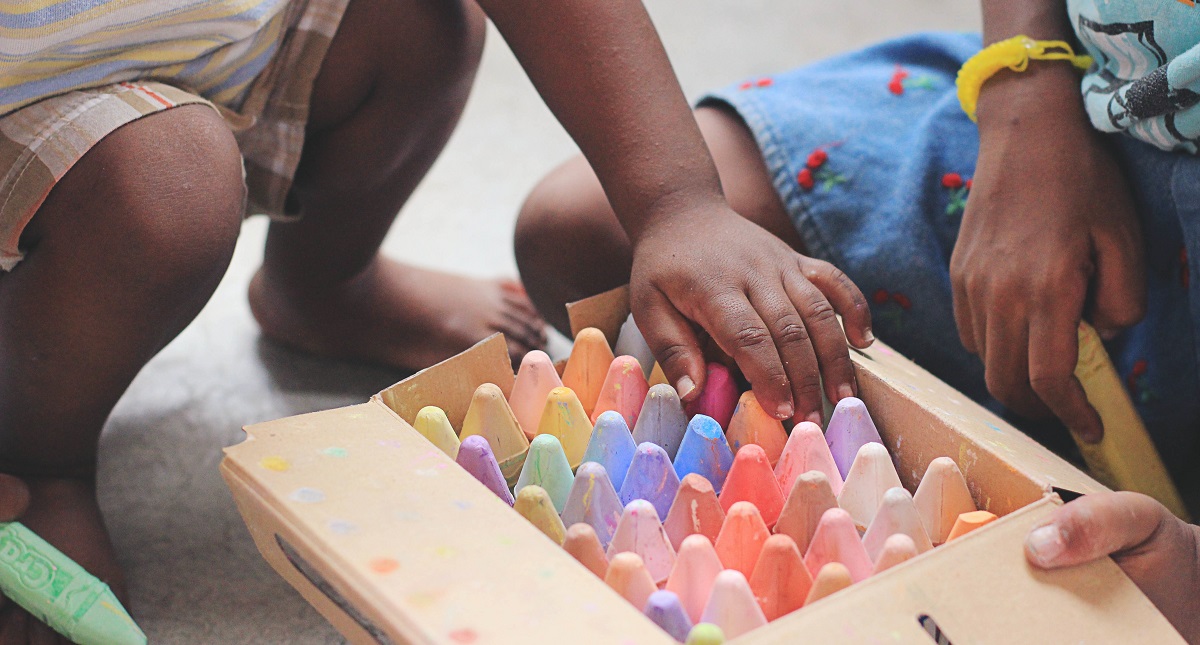Contact Us
I recently sat down for coffee with Kathy Jack, MA, LCPC to talk about the importance of play. She’s been a professional counselor since 2001 and a mom since 2006. Some of Kathy’s specialties include: child-parent interactions, child-centered play therapy, sand tray therapy, and attachment play therapy. All that to say, girlfriend has a lot of knowledge to drop.
She suggests that moms (and dads too) set aside around 20 minutes, three to four times a week for intentional one-on-one playtime. Kathy encourages moms to give that time a name. Not only does this foster a deep connection between mother and child, there are countless developmental and emotional benefits.
Here are just a few:
Play helps children communicate their feelings.
“Toys are to children as words are to adults, and play is the primary language that children speak,” says Kathy. Play provides a child with a safe and natural space to learn how to communicate and process his or her feelings. In the same way that a girls’ night out helps moms to de-stress, children learn to “vent” their emotions during play, which helps them develop into emotionally healthy adults.
As moms, after an experience with our kids, we often ask questions like: “Did you have fun?” or “Didn’t you like that?” There’s nothing wrong with that line of questioning, of course, but it forces children to give a yes or no answer, and doesn’t present them with an opportunity to explore their emotional experiences. Since play is a child’s first language, giving yours that one-on-one playtime, encourages him or her to process real-life events through imaginary ones.
For instance, a preschooler playing “animals” with her mom, might say something like, “The doggy doesn’t want to go to school.” This doesn’t necessarily mean the child is deeply traumatized about starting preschool; it just means that she might have some healthy fears about the upcoming transition, and is working out her feelings. Moms can help this process along by mirroring what the child is doing. Jack suggests that parents don’t add too much. “Simply reflect any emotions you notice. Be curious and enthusiastic, and try not to ask a lot of questions. If you are going to pose something, make sure it is a general observation like, ‘Oh the doggy doesn’t want to go to school. I wonder what will happen next.’ ”
Allowing your child to the lead the story (or draw or write the story, for older children) helps him or her face any fears with greater courage, and teaches your child how to process feelings – both positive and negative.
She also encourages moms to pay attention. “If you notice your child is ‘playing out’ a vulnerable emotional experience again and again without any resolution, you might consider partnering with a child therapist to find out if something deeper is going on.”
Play teaches children to contribute creatively to the world and boosts their self-confidence.
Just as a parent feels satisfied after contributing to the family by making a great meal, planning a fun birthday party or finishing a project, when children play, they feel like they are adding to the world around them. Play gives children a sense of satisfaction and self-worth.
As you play with your children, you can help them they discover what they love and what they’re good at. Is your daughter hilarious? Be sure to tell her how much she makes you laugh. Is your son great at building Lego towers and knocking them down? Let him know you think that’s pretty cool.
Kathy always tells moms, “Be observant. If your son is serving you a pretend bowl of soup, and you notice a big smile on his face, you can mirror that emotion by saying something like, ‘You made mommy soup! I love when you make me soup!’”
When you communicate excitement and approval of your child’s play, you boost their confidence. She also notes, “Don’t put pressure on your children to perform a certain way during playtime. In a culture where everything is performance-oriented, play is one area where your child has nothing to prove. When kids play, they need the freedom to get lost in it.”
A child who doesn’t have opportunities to play – for instance, a child always on screen time – misses out on important developmental processes like creating scenarios, telling stories, pretending, being silly and connecting emotionally with others.
Play teaches children boundaries, responsibility and empathy.
During your one-on-one playtime, kids will feel special and loved. But it’s also important for a child to know when playtime is over. This teaches your child healthy limits. Often, children will want to extend playtime but it’s beneficial to tell your child something like, “Our special time – we do that every few days and it’s just for us. But now we have to put it away, so that we can make sure we are able to do it again later.”
“The added bonus,” she says, “is that a regular set-aside playtime will build trust between you and your child as he or she learns that you will, in fact, have that special time again. So be consistent.”
Lastly, play teaches children responsibility and empathy as they learn how to play appropriately: We clean up when we are finished playing; we don’t angrily smash things; we treat others with compassion and kindness; we apologize if we hurt someone. Play shows children that they can be messy, silly and have tons of fun, but also that there are healthy boundaries around and within play.
A Few Practical Tips About Play:
- Don’t put a lot of pressure or guilt on yourself. It’s ok not to play perfectly. Sometimes you will be tired or your kids will be whiny, but that’s real life. The beauty of a regular playtime is that you have the chance to start again.
- If you can’t do twenty minutes every other day, don’t fret! Those five minutes in the car when you’re driving with your kiddos or stuck in line at the grocery store are great moments for play. Use that time to initiate a game like peekaboo, I Spy, or 20 Questions. For older kids, ask them fun open-ended questions like, “What would you do if you won a million dollars?”
- Be silly! Enjoy yourself! Don’t worry about all the things you aren’t doing. Allow yourself to be present, and to get lost in playtime with your child. Play has added benefits for adults too; it helps us experience less anxiety and depression, and increases our energy level.
Most importantly, remember that as you play with your children, you aren’t just entertaining them; you are building their self-esteem, their relational health, and their sense of love and safety. So get out there and have some fun!
You can read more about Kathy’s work at Alliance Clinical Associates.

Aubrey Sampson the mom of three crazy-hilarious sons, which is also to say that she spends most days in her pajamas drinking entirely too much coffee. On the days she manages to get dressed, Aubrey is an event and retreat speaker, a blogger, and the author of Overcomer: Breaking Down the Walls of Shame and Rebuilding Your Soul (Zondervan, 2015). She and her husband, Kevin, just planted their first church in the Chicagoland area. You can find and follow Aubrey at aubreysampson.com and @aubsamp.
